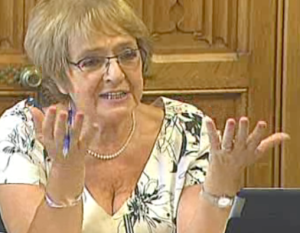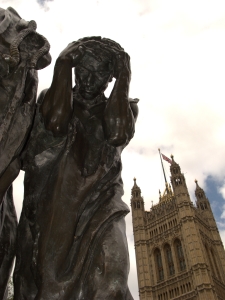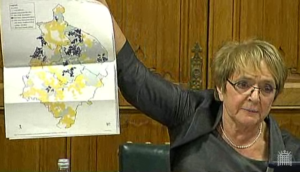Posts Tagged ‘PAC’
BT gets personal with PAC chair
Under pressure from the Public Accounts Committee to show value for money for the £1.7bn it is receiving for BDUK contracts, BT is fighting back.
Bill Broadband has just retweeted a Guido Fawkes tweet that it will “revisit” PAC chair Margaret Hodge’s tax affairs.
Bill Broadband is one of the names used by BT’s astroturf community to defend BT’s NGA roll-out and intimidate would-be competitors.
Hodge is away and unavailable for comment.
BT to cut BDUK roll-out costs – but it was already 20% cheaper
The National Audit Office (NAO) report on the BDUK’s former Rural Broadband Programme, now renamed the Superfast Broadband Programme, contains elements that might lead to cognitive dissonance.
It reports that BDUK commissioned Atkins, a primary supplier of services to government, to look at BT’s costs to provide high speed broadband in rural areas. After looking at a few sites in Suffolk, Atkins concluded “BT had charged Suffolk nearly 20% less than would hypothetically be charged by another efficient supplier, in part reflecting that BT benefits from substantial national bulk buying power compared with other providers.” Paragraph 3.10)
That’s good news, right? But it seems there’s more joy to come for taxpayers. In Paragraph 5 NAO reports “BDUK’s experience of actual costs in phase 1 has led to BT agreeing to submit lower costs in its financial model for phase 2.”
However, it carefully notes that BT was picking low hanging fruit in Phase 1, namely peri-urban areas rather than deep rural ones where is cost to reach them is likely to be higher, unless you use a satellite.
NAO also suggests BT got other sums wrong. BrOkenTeleph0n3 revealed that BT’s planners estimated BT would break even on a 20% take-up in 12-14 years. “Take-up of superfast broadband so far has been significantly faster than forecast by BT in the phase 1 contracts. Take-up has risen to more than 20% already for two non framework projects”, the NAO found. This “should bring greater coverage than contracted, as local bodies will be able to extend their rollout with remaining funds,” it says.
BT is the only framework supplier left, and 43 out of 47 county councils have opted to use the framework to procure Phase 2, although 10 may elect to hold money back for Phase 3, the final 5%.
“Overall, the effect of the first 2 phases will be to reinforce BT’s already strong position in the wholesale market for broadband infrastructure (the Wholesale Local Access Market). BT’s assets and infrastructure will benefit from approximately £1.7 billion of public sector investment although BT must maintain these assets at its own expense. BT is also required by regulatory conditions to provide wholesale access to other suppliers.”
The NAO also revealed that the public will benefit from clawbacks due to higher than expected take-up for only seven years. “After these seven years, the supplier will keep all of the extra wholesale profit.”
BT amortises its fibre over five to 20 years, and its exchange equipment over three to 13 years.
BTW, in its 2013 rural broadband report on page 35, the NAO said “The Atkins ‘should cost’ model for Northamptonshire is three per cent higher than BT’s actual bid for the area. Atkins was not able to complete analysis of a second local body area, Suffolk, due to the difficulties it encountered in modelling a more complex technical solution. Atkins’ model is the only model available to us that has tried to match a corresponding BT bid identically.”
The hour-long Public Accounts Committee interview on the NAO report, featuring DCMS, BDUK and BT officials, took place on 28 January 2015. You can see the video here.
PAC opens Act 3 of superfast broadband enquiry
There are still some people who are interested in seeing what’s happening to the near £2bn of taxpayers’ money given to BT to roll out next generation broadband in the “Final Third”. Many of them probably sit on the Commons’ Public Accounts Committee, which is taking its third stab at finding if BT is delivering value for money this coming Wednesday.
The PAC, chaired by Margaret Hodge, was previously frustrated by the answers it received (here and here), and vowed to keep asking questions until it was satisfied. BT’s director of strategy, policy and portfolio, Sean Williams, who was the source of much of Ms Hodge’s frustration, gets a third act in front of the committee.
Supporting players are DCMS boss Sue Owen, BDUK CEO Chris Townsend and superfast broadband programme director Andrew Field, and Openreach MD for infrastructure delivery Kim Mears.
In its preamble the PAC said its reports on the rural broadband programme in September 2013 and April 2014 “raised concerns over lack of published information on BT’s plans for superfast broadband coverage, the availability and transparency of cost data and the level of competition secured throughout the programme. This recall session will examine the transparency of cost and rollout information and explore whether the department has done enough to promote greater competition for phases 2 and 3 of the programme.”
The curtain for the hour-long show goes up at 2.15pm on Wednesday 28 January 2015, Committee Room 15, Palace of Westminster. If you can’t make it in person you can follow on Parliament TV: Rural broadband: progress update session.
Show us the money, PAC’s Hodge warns contractors

PAC chairman Hodge – ‘There is a lack of transparency and openness around government’s contracts with private providers’.
A government report into private contractors who deliver public services has suggested the government is to blame for the lack of transparency that has led to serious shortcomings in value for money for taxpayers.
“These failures have exposed serious weaknesses in the government’s ability to negotiate and manage contracts with private companies on our behalf,” public accounts committee chairman Margaret Hodge said at the release of the PAC’s report on private contractors and public spending. The report may have implications for contracts worth £1.4bn BT has signed with county councils to deliver next generation broadband.
The PAC report looked at contracts with G4S, Atos, Serco and Capita. Some, such as the G4S and Serco contracts to tag prisoners electronically, and G4S to supply security to the 2012 Olympics, have become notorious for their abuse of the spirit of partnership, in particular for over-charging.
“There is a lack of transparency and openness around government’s contracts with private providers, with ‘commercial confidentiality’ frequently invoked as an excuse to withhold information,” Hodge said.
The PAC earlier identified these traits in the BT contracts, all of which are subject to non-disclosure clauses and restrictions on speed and coverage details and financial information.
“These failures have also exposed serious weaknesses in the government’s ability to negotiate and manage contracts with private companies on our behalf,” Hodge said.
“It is vital that parliament and the public are able to follow the taxpayers’ pound to ensure value for money. So, today we are calling for three basic transparency measures:
- the extension of Freedom of Information to public contracts with private providers;
- access rights for the National Audit Office; and
- a requirement for contractors to open their books up to scrutiny by officials
“The four private contractors we met – G4S, Atos, Serco and Capita – all told us they were prepared to accept these measures. It therefore appears that the main barriers to greater transparency lie within government itself.”
Hodge said an absence of real competition had led to privately-owned public monopolies that had become “too big to fail”.
Small and medium enterprises (SMEs) had been crowded out by the complexity of the contracting process, excessive bureaucracy and high bidding costs.
Contracting had led to the evolution of privately-owned public monopolies, who largely, or in some cases wholly, relied on taxpayers’ money for their income. “The state is then constrained in finding alternatives where a big private company fails,” she said.
“We intend to return to this issue. Government is clearly failing to manage performance across the board, and to achieve the best for citizens out of the contracts into which they have entered. Government needs a far more professional and skilled approach to managing contracts and contractors, and contractors need to demonstrate the high standards of ethics expected in the conduct of public business, and be more transparent about their performance and costs,” Hodge said.
“With the government choosing to contract out more and more public services to the private sector, these issues become ever more important. This report is intended as a recipe for better services, better governance and greater openness. We hope the government will take heed of our recommendations.”
BT to broadband councils: Ask yourself – do I feel lucky?
So, what did we learn from Round 2 of the Public Accounts Committee (PAC) v BT/BDUK (rural broadband division)?
Hopefully not as much as we shall learn in the promised Round 3, but it had better come soon before we all lose interest and find better things to do with our lives, like learning macramé.
What did emerge were clearer reasons for BT’s secrecy. Former Ofcom official Sean Williams, who spoke for BT, said that the equipment BT is installing in the BDUK intervention areas is exactly the same as that which it is installing in its commercial roll-out. Therefore revealing the price it pays for equipment in the BDUK areas would help its competitors in the rest of the country.
This is disingenuous, perhaps delusional. No-one wants to duplicate BT’s copper network, so the price of a DSLAM and its path is irrelevant to competitors. The few firms that do want to provide connectivity in rural areas want to run fibre to the home or to a distribution point (call it a digital village pump if you will), and from there use high speed wireless to the home.
They would find it helpful if they could use BT’s ducts and poles and cabinets to do some of it, but as they would be able to offer faster speeds than BT’s copper, BT wants to keep them off its passive infrastructure at all costs.
Most would also like BT to backhaul their local traffic, but few can afford to pay the charges BT is asking to build (or light) the connecting fibres.
Someone should be checking these costs, because Ofcom has allowed BT to set its own prices for wholesale fibre access. In consequence Ofcom is now having to investigate a TalkTalk complaint that BT has run a margin squeeze on the product.
More to the point, in many cases BT fibre already goes to rural villages and towns, but only to schools and other public sector enterprises like hospitals and clinics. It would have been extraordinarily short-sighted of BT to run only a single fibre pair to each of these places, so there are likely to be spare unlit fibres in the neighbourhood. These could be put into service in short order at marginal cost. If someone was paying attention.
Even if BT was that myopic, there is likely to be spare capacity on the fibre pair due to different peak times for business and recreational traffic. Even if this got congested, well, BT now knows how to make ordinary fibre carry 1.4Tbps over distances of more than 400km. That should be enough for most rural communities, at least in the short term.
The other thing we discovered is BT’s employment of Catch-22 with respect to post codes. Williams said BT’s policy is that local councils are free to publish maps that contain BT’s proposed speed and coverage data down to seven-digit post code level. This is precise enough to say what upload and download speeds each and every premises in the country will be able to get. Two, Northamptonshire and Dorset have apparently done so. But it’s up to councils to decide.
Most other councils have published speed and coverage maps down to five-digit post code granularity. This is because, Williams said, the finer details revealed in the seven-digit post cost templates are secret and covered by the non-disclosure covenants in the contracts councils have signed with BT. Publishing them would break the contract and theoretically open them to legal action from BT.
Catch-22, or as Dirty Harry said, “You have to ask yourself a question – Do I feel lucky? Well, do you?”
Unfortunately none of the MPs on the PAC sought an assurance from Williams that BT will not exercise its rights if councils publish the speed and coverage details at the seven-digit resolution. Hopefully they will do so in Round 3.
One bit of good news that almost got lost in the noise is that BDUK’s analysis of early roll-out invoices suggest that BT has over-estimated by about one-third the associated management overhead costs.
It’s early days yet, and as the BT installation teams gain experience, those savings should grow. One hopes that they will not be used to finance the new £50m expansion of BT’s city fibre networks.
See the Round 2 video here starting at 16.53.20.
The NAO report on BDUK: what Miller needs to do now
It is sad but true that the National Audit Office’s investigation into the value for money from the BDUK Framework procurement has largely vindicated Br0kenTeleph0n3’s reportage over the past three years.
Fearing a repeat of the folly and waste that was the NHS’s National Programme for IT, we hoped that following the BDUK money would alert ministers and civil servants to the fact they were under scrutiny, and that they would be resolute in defending the public interest.
The NAO’s report shows, with understated clarity, that Br0kenTeleph0n3 failed to achieve that goal.
The NAO found that, despite ministers’ and civil servants’ best efforts, BT’s network will benefit from £1.2bn of taxpayers’ money, that BT’s monopoly outside the cities will be further entrenched, that there is no clear way here to assess value for taxpayers’ money, and that whatever BT delivers under the framework will be late and less than “the best broadband network in Europe” the nation was promised.
The NAO offered a number of recommendations and lessons learned, one of which was to benchmark prices to industry standards or a ‘should-cost’ model early in the process. This would inform the assessment of all supplier costs.
The Public Accounts Committee (PAC) will meet to discuss the NAO report on Wednesday. Even as the first drafts of the NAO’s report were doing the rounds in Whitehall, culture secretary Maria Miller moved to limit the damage.
Miller has summoned six would-be community network operators (altnets) from the “Final 10%” to meet BT and BDUK representatives to thrash out a potentially less embarrassing scenario than BDUK has proved. She hopes to offer that as a sop to the PAC.
The six altnets are bidding for money from the £20m Rural Community Broadband Fund (RCBF), which is available only to projects in the “Final 10%”. The amount is trivial in the next generation broadband accounts, and besides, the department of the environment, food and rural affairs (DEFRA) is putting up half.
BT has already said serving these areas, indeed the whole “Final Third”, is “uneconomic”; why then is it fighting so hard to keep out altnets? Why has it insisted that the speed and coverage details of its BDUK-funded roll-out are kept secret?
The official version is that BT’s roll-out is “subject to survey” i.e. it doesn’t know where its assets are or what condition they are in, and that therefore its plans may change. Such a change might result in BT overbuilding an altnet’s network, which is illegal under state aid rules. Better therefore not to risk BDUK money competing with RCBF money by stopping the altnets from building, at least until BT’s finished its bit.
Or, since altnets have to give BT an effective veto over their plans, to let BT cherry-pick the few villages and hamlets that might provide the altnets with a viable user base, and leave the “Final 2%” to the altnets and the satellite operators to mop up after 2017.
This is a seductive argument in terms of political risk. But what if Miller is more imaginative? These six altnets could be the true pilot projects that point the way to a different status quo for rural broadband.
More importantly, they could provide real benchmarks against which to measure BT’s performance. That alone could offer a real shot at extracting value for taxpayers, fulfill an NAO key lesson, and provide Miller a meaty bone for the PAC.




